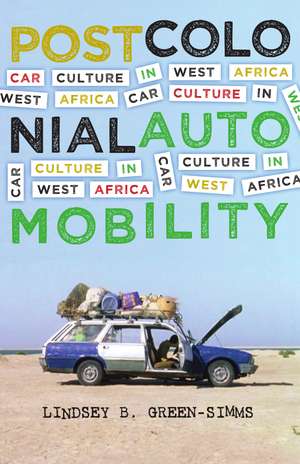Postcolonial Automobility: Car Culture in West Africa
Autor Lindsey B. Green-Simmsen Limba Engleză Paperback – 24 oct 2017
For more than a century cars have symbolized autonomous, unfettered mobility and an increasingly global experience. And yet, they are often used differently outside the centers of global capitalism. This pioneering book considers how, through the lens of the automobile, we can assess the pleasures, dangers, and limits of global modernity in West Africa. Through new and provocative readings of famous plays, novels, and films, as well as recent popular videos, Postcolonial Automobility reveals the surprising ways in which automobility in the region is, at once, an everyday practice, an ethos, a fantasy of autonomy, and an affective activity intimately tied to modern social life.
Lindsey B. Green-Simms begins with the history of motorization in West Africa from the colonial era to the decolonizing decades after World War II, and addresses the tragedy of car accidents through a close reading of Wole Soyinka’s 1965 postindependence play The Road. Shifting to screen media, she discusses Ousmane Sembene’s Xala and Jean-Pierre Bekolo’s Quartier Mozart and reviews popular, low-budget Nollywood films. Finally, Green-Simms considers how feminist texts rewrite and work in dialogue with the male-centered films and novels where the car stands in for patriarchal power and capitalist achievement.
Providing a unique perspective on technology in Africa—one refusing to be confined to narratives of either underdevelopment or inevitable progress—and covering a broad range of interdisciplinary material, Postcolonial Automobility will appeal not only to scholars and students of African literature and cinema but also to those in postcolonial and globalization studies.
Lindsey B. Green-Simms begins with the history of motorization in West Africa from the colonial era to the decolonizing decades after World War II, and addresses the tragedy of car accidents through a close reading of Wole Soyinka’s 1965 postindependence play The Road. Shifting to screen media, she discusses Ousmane Sembene’s Xala and Jean-Pierre Bekolo’s Quartier Mozart and reviews popular, low-budget Nollywood films. Finally, Green-Simms considers how feminist texts rewrite and work in dialogue with the male-centered films and novels where the car stands in for patriarchal power and capitalist achievement.
Providing a unique perspective on technology in Africa—one refusing to be confined to narratives of either underdevelopment or inevitable progress—and covering a broad range of interdisciplinary material, Postcolonial Automobility will appeal not only to scholars and students of African literature and cinema but also to those in postcolonial and globalization studies.
Preț: 147.32 lei
Preț vechi: 170.61 lei
-14% Nou
Puncte Express: 221
Preț estimativ în valută:
28.19€ • 29.43$ • 23.33£
28.19€ • 29.43$ • 23.33£
Carte indisponibilă temporar
Doresc să fiu notificat când acest titlu va fi disponibil:
Se trimite...
Preluare comenzi: 021 569.72.76
Specificații
ISBN-13: 9781517901141
ISBN-10: 1517901146
Pagini: 280
Ilustrații: 41 black and white illustrations
Dimensiuni: 140 x 216 x 20 mm
Greutate: 0.37 kg
Ediția:1
Editura: University of Minnesota Press
Colecția Univ Of Minnesota Press
ISBN-10: 1517901146
Pagini: 280
Ilustrații: 41 black and white illustrations
Dimensiuni: 140 x 216 x 20 mm
Greutate: 0.37 kg
Ediția:1
Editura: University of Minnesota Press
Colecția Univ Of Minnesota Press
Notă biografică
Lindsey B. Green-Simms is assistant professor of literature at American University in Washington, D.C.
Cuprins
Contents
Introduction: Thinking Automobility, Feeling Automobility
1. The Hum of Progress: Motorcars and the Modernization of West Africa
2. “No Danger No Delay”: Wole Soyinka and the Perils of Driving
3. Moving Pictures, Mired Cars: The Automobile in African Francophone
4. The Return of the Mercedes: Upward Mobility, the Good Life, and Nigerian Video Film
5. Women in Traffic: Towards a Feminist Automobility
Conclusion: Global (Be)Longings
Acknowledgments
Notes
Bibliography
Index
Introduction: Thinking Automobility, Feeling Automobility
1. The Hum of Progress: Motorcars and the Modernization of West Africa
2. “No Danger No Delay”: Wole Soyinka and the Perils of Driving
3. Moving Pictures, Mired Cars: The Automobile in African Francophone
4. The Return of the Mercedes: Upward Mobility, the Good Life, and Nigerian Video Film
5. Women in Traffic: Towards a Feminist Automobility
Conclusion: Global (Be)Longings
Acknowledgments
Notes
Bibliography
Index
Recenzii
"Clear, lucid, and engaging. Lindsey B. Green-Simms does an excellent job mediating close literary analysis, broader historical and cultural focus on the car in Africa, and astute theoretical readings."—Marian Aguiar, Carnegie Mellon University
"With Postcolonial Automobility, Lindsey B. Green-Simms produces a veritable socio-cultural biography of the automobile and illustrates this through various sources including literary texts, African art and popular movies, the variable opinions of car owners and their users, and the multiple urban legends that have grown up with and around vehicles in this part of Africa. It is a beautifully written gift offering to this most desired object of African modernity."—Ato Quayson, University of Toronto, author of Oxford Street, Accra: City Life and the Itineraries of Transnationalism
"With Postcolonial Automobility, Lindsey B. Green-Simms produces a veritable socio-cultural biography of the automobile and illustrates this through various sources including literary texts, African art and popular movies, the variable opinions of car owners and their users, and the multiple urban legends that have grown up with and around vehicles in this part of Africa. It is a beautifully written gift offering to this most desired object of African modernity."—Ato Quayson, University of Toronto, author of Oxford Street, Accra: City Life and the Itineraries of Transnationalism
